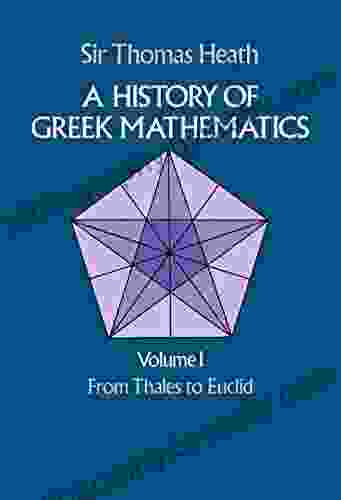From Thales to Euclid: A Comprehensive Guide to Ancient Greek Mathematics

4.7 out of 5
| Language | : | English |
| File size | : | 7106 KB |
| Text-to-Speech | : | Enabled |
| Screen Reader | : | Supported |
| Enhanced typesetting | : | Enabled |
| Print length | : | 604 pages |
| Lending | : | Enabled |
Ancient Greek mathematics is one of the most important and influential bodies of knowledge in the history of human thought. It laid the foundations for much of modern mathematics, and its ideas continue to be used and developed today. This book provides a comprehensive overview of ancient Greek mathematics, from the Pre-Socratics to Euclid. It covers the major figures and concepts of Greek mathematics, and provides a detailed analysis of the development of Greek mathematical thought.
The Pre-Socratics
The Pre-Socratics were a group of philosophers who lived in Greece in the 6th and 5th centuries BC. They were the first to develop systematic theories about the natural world, and their ideas had a profound influence on the development of Greek mathematics. Among the most important Pre-Socratics were Thales, Anaximander, and Pythagoras.
Thales was a mathematician and astronomer who lived in Miletus in the 6th century BC. He is credited with being the first to develop a systematic theory of geometry. Thales used geometry to solve a variety of problems, including the calculation of the height of the Great Pyramid of Giza. He also developed a theorem that states that the sum of the angles of a triangle is equal to 180 degrees.
Anaximander was a philosopher and astronomer who lived in Miletus in the 6th century BC. He was a student of Thales, and he developed a number of important ideas in mathematics and astronomy. Anaximander was the first to propose that the Earth is a sphere, and he also developed a theory of evolution that suggested that all living things evolved from a single source.
Pythagoras was a philosopher and mathematician who lived in Samos in the 6th century BC. He is best known for his theorem that states that the square of the hypotenuse of a right triangle is equal to the sum of the squares of the other two sides. Pythagoras also developed a number of other important ideas in mathematics, including the theory of musical intervals.
The Classical Period
The Classical period of Greek mathematics began in the 5th century BC and lasted until the 4th century BC. This period saw the development of a number of important mathematical concepts, including the theory of proportions, the method of exhaustion, and the concept of infinity. Among the most important mathematicians of the Classical period were Plato, Aristotle, and Archimedes.
Plato was a philosopher who lived in Athens in the 4th century BC. He was a student of Socrates, and he developed a number of important ideas in mathematics and philosophy. Plato believed that mathematics was the key to understanding the universe, and he used mathematics to develop his theory of Forms. Plato also developed a number of important mathematical concepts, including the concept of the ideal triangle.
Aristotle was a philosopher who lived in Athens in the 4th century BC. He was a student of Plato, and he developed a number of important ideas in logic, physics, and metaphysics. Aristotle also made a number of important contributions to mathematics, including the development of the theory of syllogism and the concept of infinity.
Archimedes was a mathematician and inventor who lived in Syracuse in the 3rd century BC. He is best known for his work on the lever, the pulley, and the screw. Archimedes also developed a number of important mathematical concepts, including the concept of the center of gravity and the method of exhaustion. Archimedes is considered to be one of the greatest mathematicians of all time.
The Hellenistic Period
The Hellenistic period of Greek mathematics began in the 4th century BC and lasted until the 1st century BC. This period saw the development of a number of important mathematical concepts, including trigonometry, conic sections, and calculus. Among the most important mathematicians of the Hellenistic period were Euclid, Apollonius, and Archimedes.
Euclid was a mathematician who lived in Alexandria in the 3rd century BC. He is best known for his work on geometry, which is set out in his book The Elements. The Elements is one of the most important works in the history of mathematics, and it has been used as a textbook for geometry for over two thousand years. Euclid also developed a number of other important mathematical concepts, including the concept of the greatest common divisor and the concept of the least common multiple.
Apollonius was a mathematician who lived in Alexandria in the 3rd century BC. He is best known for his work on conic sections, which is set out in his book Conics. Conics is one of the most important works in the history of mathematics, and it has been used as a textbook for conic sections for over two thousand years. Apollonius also developed a number of other important mathematical concepts, including the concept of the focus and the concept of the directrix.
Archimedes was a mathematician and inventor who lived in Syracuse in the 3rd century BC. He is best known for his work on the lever, the pulley, and the screw. Archimedes also developed a number of important mathematical concepts, including the concept of the center of gravity and the method of exhaustion. Archimedes is considered to be one of the greatest mathematicians of all time.
The Legacy of Ancient Greek Mathematics
Ancient Greek mathematics had a profound influence on the development of mathematics in later periods. Greek mathematical concepts were adopted by the Arabs, the Indians, and the Europeans, and they continue to be used and developed today. Greek mathematics has also had a major impact on other fields of science, such as physics, astronomy, and engineering. The legacy of ancient Greek mathematics is vast and enduring, and it continues to inspire mathematicians and scientists today.
4.7 out of 5
| Language | : | English |
| File size | : | 7106 KB |
| Text-to-Speech | : | Enabled |
| Screen Reader | : | Supported |
| Enhanced typesetting | : | Enabled |
| Print length | : | 604 pages |
| Lending | : | Enabled |
Do you want to contribute by writing guest posts on this blog?
Please contact us and send us a resume of previous articles that you have written.
 Book
Book Novel
Novel Page
Page Chapter
Chapter Text
Text Story
Story Genre
Genre Reader
Reader Library
Library Paperback
Paperback E-book
E-book Magazine
Magazine Newspaper
Newspaper Paragraph
Paragraph Sentence
Sentence Bookmark
Bookmark Shelf
Shelf Glossary
Glossary Bibliography
Bibliography Foreword
Foreword Preface
Preface Synopsis
Synopsis Annotation
Annotation Footnote
Footnote Manuscript
Manuscript Scroll
Scroll Codex
Codex Tome
Tome Bestseller
Bestseller Classics
Classics Library card
Library card Narrative
Narrative Biography
Biography Autobiography
Autobiography Memoir
Memoir Reference
Reference Encyclopedia
Encyclopedia Sam Hendricks
Sam Hendricks Gerald L Kooyman
Gerald L Kooyman Gary Bracken
Gary Bracken Kent Blansett
Kent Blansett Gabrielle Euvino
Gabrielle Euvino Gary W Eldred
Gary W Eldred Gennifer Choldenko
Gennifer Choldenko James Ferace
James Ferace Georgios Papadakis
Georgios Papadakis Friedrich Glauser
Friedrich Glauser George Herman
George Herman George Dawson
George Dawson Gary Lincoff
Gary Lincoff Robert J Shiller
Robert J Shiller George Lakey
George Lakey James Abbott Mcneill Whistler
James Abbott Mcneill Whistler Ga Henty
Ga Henty Garvenchy Nicolas
Garvenchy Nicolas George J Sanchez
George J Sanchez Gay Ingram
Gay Ingram
Light bulbAdvertise smarter! Our strategic ad space ensures maximum exposure. Reserve your spot today!

 Jaime MitchellGeorge Washington: From Boy Surveyor to Soldier - An Extraordinary Journey of...
Jaime MitchellGeorge Washington: From Boy Surveyor to Soldier - An Extraordinary Journey of...
 Garrett PowellLetters And Notes On The Manners Customs And Condition Of The North American:...
Garrett PowellLetters And Notes On The Manners Customs And Condition Of The North American:... Rudyard KiplingFollow ·7.7k
Rudyard KiplingFollow ·7.7k F. Scott FitzgeraldFollow ·11.9k
F. Scott FitzgeraldFollow ·11.9k Francisco CoxFollow ·8.7k
Francisco CoxFollow ·8.7k Kyle PowellFollow ·19.3k
Kyle PowellFollow ·19.3k Rodney ParkerFollow ·9.3k
Rodney ParkerFollow ·9.3k Marcus BellFollow ·2.8k
Marcus BellFollow ·2.8k Alan TurnerFollow ·5.7k
Alan TurnerFollow ·5.7k W. Somerset MaughamFollow ·17.8k
W. Somerset MaughamFollow ·17.8k

 Brian West
Brian WestSmedley Butler: The Marines and the Making and Breaking...
: A Marine's...

 Gabriel Garcia Marquez
Gabriel Garcia MarquezIschia, Capri, Sorrento, Positano, And Amalfi: An...
Explore the...

 Felix Carter
Felix CarterAdorn Your Little Princess with Fleur Ange's Exquisite...
Welcome to the enchanting...

 Kelly Blair
Kelly BlairUnveiling the Secrets of the Historical Way and Fishermen...
Step into the pages...

 Angelo Ward
Angelo WardKnit the Cutest Thumbless Mittens for Your Little One:...
Prepare to be...
4.7 out of 5
| Language | : | English |
| File size | : | 7106 KB |
| Text-to-Speech | : | Enabled |
| Screen Reader | : | Supported |
| Enhanced typesetting | : | Enabled |
| Print length | : | 604 pages |
| Lending | : | Enabled |










